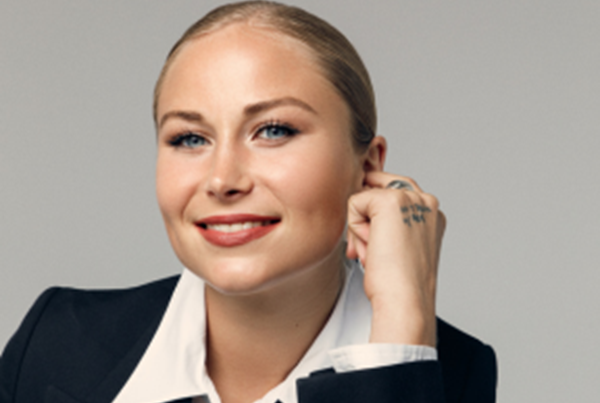There are three ways that author, speaker and activist Grace Tame looks after her physical and mental health.
The first is running. Not just running – ultra marathons. Long-distance, outdoor trail runs.
“I’ll be damned if I have to run on a treadmill,” she told Women’s Agenda recently.
“It takes a lot of dedication, but also consistent training. You can’t train like that forever though… you have to sacrifice a lot of other things in your daily life to allow for time to do it. You have to make compromises in your social life and your professional life.”
The second – putting on her favourite music and dancing around her living room.
“I love to listen to good old classic rock and roll,” Tame says. “Generally any music from the 60s, 70s and 80s tends to be my jam.”
The third is simple: spending time with friends. Every Saturday night, Tame sees her best friend Dom. The pair – who are both autistic – have been friends since they were seven years old.
“We can sit with each other for days, weeks on end, and not say a word to each other at all,” Grace says.
“But we are speaking the same language. We can have a conversation without words.”
Grace Tame is speaking at the 2024 Women’s Health and Wellbeing Summit hosted by Women’s Agenda on September 4 in Sydney. As a neurodiverse, autistic woman, she shares her experience navigating a health system – a society – that is designed for neurotypical people.
“Neurodiversity is anything other than a different type of brain,” Tame says.
“People seem to think it’s a defect or a condition where neurodiversity can be limiting and can be disabling, but the neurotypical experience has overwhelmed the majority in the mainstream, so many neurodivergent people are faced with so many barriers that they struggle to survive, let alone thrive.”
Women’s health
There’s no doubt there are some problems with how women are cared for in Australia’s health system. Conditions go undiagnosed, women aren’t believed by practitioners, and gender gaps in health grow wider and wider.
“It’s the system itself that’s the failure,” Tame says, “and it’s built up cumulatively over such a long period of time.
“And how do you define a system? It’s not just made up of people – it’s made up of all these failed protocols and practices, lacking resources and funding.
“But really, where I think the most obvious failure has been – and I don’t think we can deny this anymore – has been the overemphasis on men’s health, and men’s pain.”
Tame is right: a lot of medical research is focused on one type of body – a white man’s body. Or, as Assistant Minister for Health Ged Kearney likes to put it, “a 50-year-old white man from Pennsylvania”.
“The denial of female experiences, characterising women’s legitimate expressions of pain as hysteria, as overreaction, and there’s just not been adequate research into all of these things,” Tame says.
The realisation of all this came to a head when Tame was first diagnosed with endometriosis. Now 11 weeks post her first laparoscopy, she remembers the first time telling her mother about her symptoms.
“In the early days, when I was describing my experiences to her, she’s sort of looking at me with this frown on her face – because her experiences of periods were very much like what I was explaining to her,” Tame says.
“I think she had endometriosis. And I think Nan had it as well. And we just have been taught this mythology that periods are just painful and we just have to accept it.”
Neurodiversity
A fan of 60s and 70s rock and roll music, Tame makes a reference to a lyric from a Roxy Music song, ‘Avalon’: Much communication, in a motion / Without conversation, or a notion.
That’s pretty much how her hang-outs with her friend Dom go. They can sit together without saying a word – but know exactly what one another is saying.
“There’s probably 10 people in my life who I could say really know me and who I am,” Tame says. “One of them is my best friend, Dom.”
Society is changing its views on neurodiversity, but Tame, who is autistic, says there is still a long way to go.
“I wish that people understood that being neurodivergent is not a condition, it’s not an affliction, it’s not an illness, you’re not broken,” Tame says.
Representation is the first step to making changes: Tame says there has to be more of a focus on the positive things about neurodiversity.
“Neurodiversity hasn’t had enough representation or enough positive representation,” Tame says.
“And when anything is new, it is at first ugly. It is at first really rough and raw. And we’re in that really rough and raw, early exposure stage where we’re trying to get notice, we’re trying to get representation. And that can be really hard.”
“There’s not enough focus yet on all the positive things about being neurodivergent, which is like having a different set of skills, just like neurotypical people have skills.”
Grace Tame will be speaking at our 2024 Women’s Health and Wellbeing Summit in Sydney on September 4. Get your tickets here.


